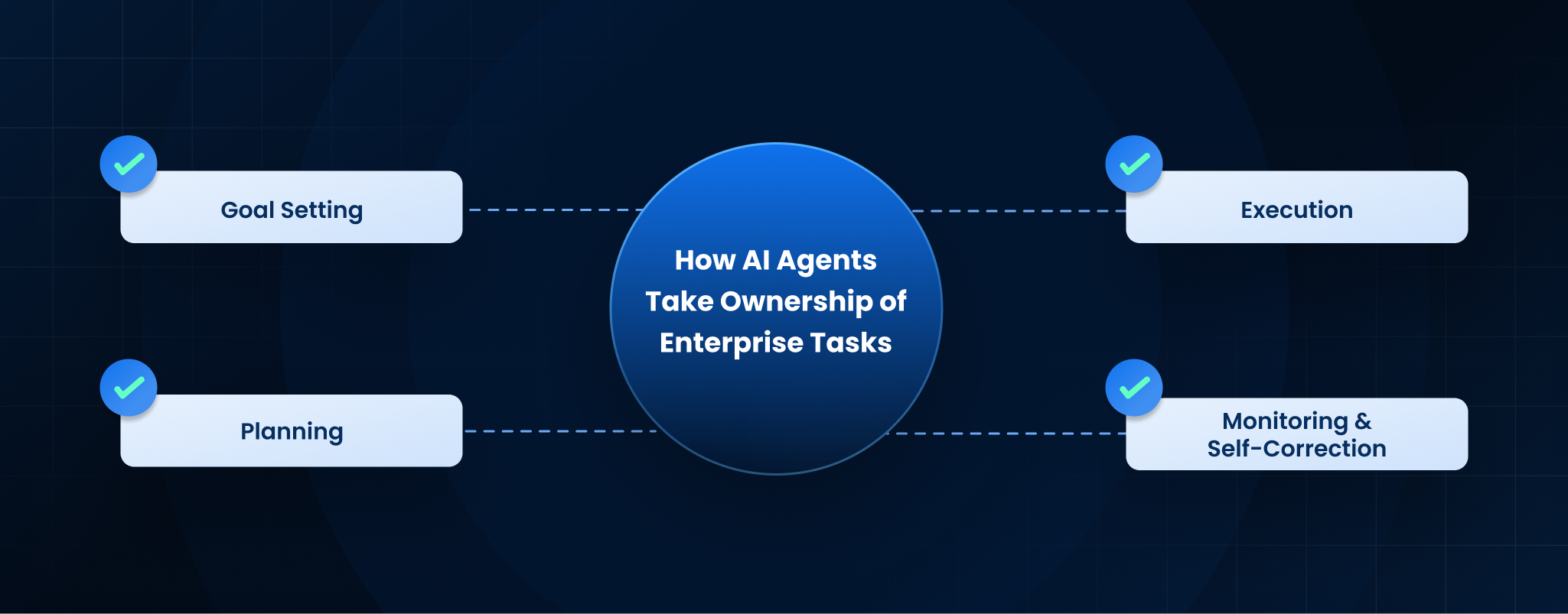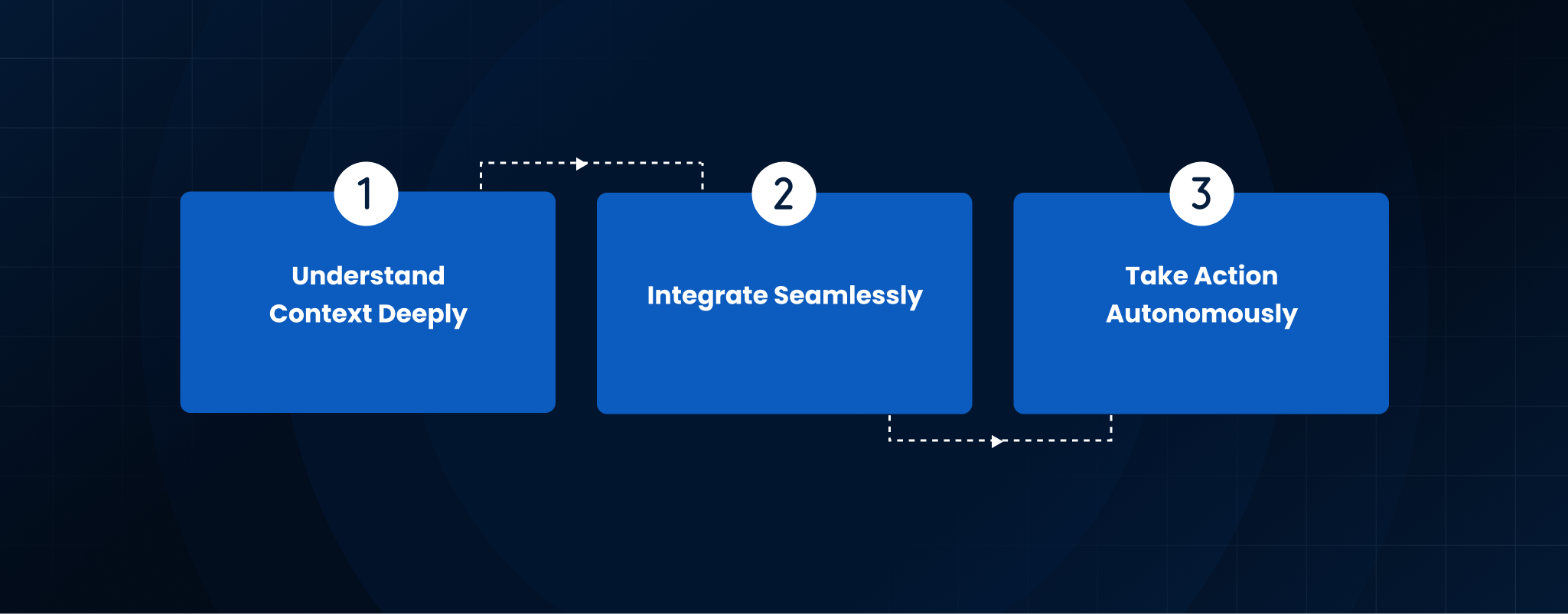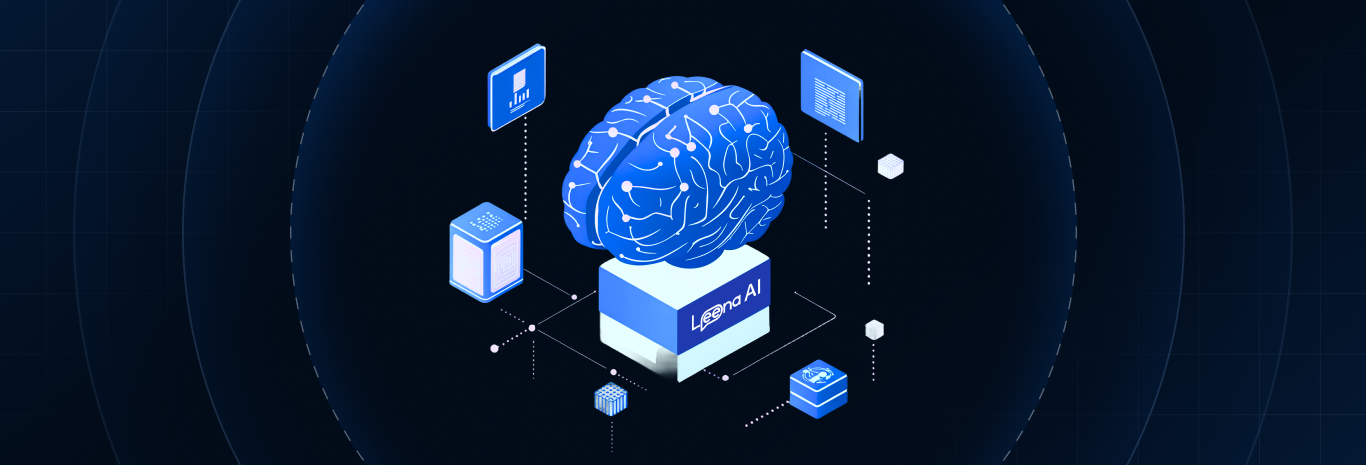Introduction
In today’s fast-paced corporate world, technology leaders like you are constantly seeking innovations that don’t just optimize, but truly transform operations. You’re navigating a landscape where every dollar, every minute, and every employee experience counts. This is where agentic automation steps onto the stage , a game-changer for how large US companies manage their IT, HR, and Finance ticketing systems.
Forget simple chatbots or basic script-based automation. We’re talking about a new paradigm where artificial intelligence doesn’t just respond; it acts. These AI agents take ownership of tasks, understand context, and drive resolutions autonomously, much like a capable human team member, but at scale and with unparalleled speed.
Driving Efficiency with Agentic Automation
The pursuit of efficiency is a never-ending quest for technology leaders. In 2025, the pressure to do more with less while enhancing employee experience is more intense than ever. Traditional automation tools have helped, but they often hit a wall when faced with complex, multi-step, or nuanced requests. This is precisely where agentic automation shines.
Think of your current ticketing system. When an employee has an issue, a ticket is created, assigned, and often bounces between departments or requires multiple interactions for resolution. This process, while necessary, can be a drain on resources and employee morale. With agentic automation, this changes dramatically.
Here’s how AI agents elevate efficiency:
- Autonomous Problem-Solving: Instead of just providing information, an agentic system can diagnose, troubleshoot, and even fix common issues independently. For instance, if an employee reports a “locked account,” the AI agent can verify identity, securely reset the password, and confirm resolution, all without human intervention.
- Contextual Understanding: These agents don’t just match keywords; they understand the intent behind a request, even if phrased unconventionally. They can pull historical data, user profiles, and past interactions to inform their actions, ensuring a personalized and effective response.
- 24/7 Availability and Instant Action: Employees expect immediate support, regardless of time zones or office hours. Agentic automation provides always-on assistance, resolving issues in seconds, not hours or days. This dramatically reduces downtime for employees and keeps the business moving.
Ultimately, this increased efficiency isn’t just about cutting costs; it’s about empowering your workforce to focus on high-value, strategic initiatives rather than getting bogged down in routine operational hurdles.
How AI Agents Take Ownership of Enterprise Tasks
The “agentic” part of agentic automation is key. It signifies a shift from passive automation to active responsibility. An AI agent doesn’t just follow a script; it sets goals, plans actions, executes them, and even self-corrects if necessary.
Consider the journey of a typical enterprise request:
-
Goal Setting: An employee needs a new software license. The AI agent understands the goal: procure the license and install it.
-
Planning: The agent identifies the steps: check software inventory, verify user permissions, initiate a purchase request if needed, and schedule installation.
-
Execution: The agent then interacts with various internal systems , the procurement platform, the IT asset management database, and the software deployment tool , to carry out each step.
-
Monitoring & Self-Correction: If, for example, the license key is invalid, the agent doesn’t give up. It can then initiate a new request to the vendor, notify the user, and keep track of the process until successful completion.
This level of ownership means that instead of simply passing a ticket to the next human in line, the AI agent truly owns the resolution process from start to finish. This is particularly impactful for complex, multi-system workflows prevalent in large organizations.

Reducing Manual Workflows in IT, HR, and Finance
The benefits of agentic automation are most profound in areas burdened by high volumes of repetitive, rule-based, or time-sensitive tasks. IT, HR, and Finance departments in large enterprises are prime candidates for this transformation.
- IT Department:
- Account Management: Password resets, account unlocks, access provisioning to applications or systems.
- Troubleshooting: Diagnosing common software issues, network connectivity problems, and providing immediate fixes or guided solutions.
- Hardware/Software Requests: Managing requests for new equipment, software installations, and license renewals.
- HR Department:
- Employee Inquiries: Answering questions about benefits, payroll, company policies, and leave requests.
- Onboarding/Offboarding: Initiating necessary system access for new hires or disabling accounts for departing employees.
- Compliance Checks: Ensuring necessary forms are completed and submitted.
- Finance Department:
- Expense Reports: Assisting with policy adherence, processing common claims, and answering questions.
- Invoice Management: Routing invoices for approval, answering vendor queries about payment status.
- Budget Inquiries: Providing real-time information on departmental budgets and spending.
By offloading these manual workflows, your skilled human teams are freed up to tackle strategic projects, innovate, and focus on human-centric interactions that truly require their expertise and empathy.
Real-World Examples of Agentic Automation in Action
Let’s look at how agentic automation translates into tangible improvements for a large company.
Imagine a critical server outage at 3 AM. Instead of a human engineer being woken up, an AI agent detects the anomaly. The agent doesn’t just log a ticket; it proactively:
- Initiates diagnostic checks.
- Analyzes logs for root causes.
- Attempts to restart services or even provision a new instance from a backup.
- Notifies relevant teams with a comprehensive summary of its actions and findings, all before a human even starts their day.
Now consider a new employee starting at your company. An HR agent doesn’t just send a welcome email. It can:
- Automatically enroll them in benefits programs.
- Provision access to necessary software accounts.
- Schedule their initial orientation meetings.
- Answer common onboarding questions without any human HR intervention, ensuring a smooth and personalized start.
These examples illustrate the power of AI agents moving beyond simple answers to active, intelligent problem-solving.
Overcoming Common Automation Roadblocks
Implementing advanced technology like agentic automation naturally comes with considerations. As a technology leader, you’re rightfully concerned about security, integration complexity, and the impact on your team.
Here’s how these common roadblocks are being addressed:
- Security and Access: Modern agentic platforms are built with enterprise-grade security. They integrate with existing identity management systems, adhering to “least privileged access” principles. This means an AI agent only has the permissions it needs to complete a specific task, and every action is logged for auditability.
- Integration Challenges: While integrating with diverse legacy systems can be complex, leading platforms provide robust API connectors and low-code/no-code integration tools. This allows for seamless connection to your existing ticketing systems, identity providers, and internal applications without a massive overhaul.
- Human-in-the-Loop: Agentic automation isn’t about eliminating humans; it’s about augmenting them. For complex or sensitive issues, the AI agent is designed to seamlessly escalate to a human expert, providing all the context and attempted actions. This ensures critical thinking and human empathy are always available when needed.
- Preventing “Hallucinations”: Advanced AI agents leverage Retrieval Augmented Generation (RAG) to pull accurate, verified information from your company’s knowledge base. They are continuously monitored and trained to ensure responses are factual, compliant, and avoid generating incorrect or irrelevant information.
Measuring ROI from Agentic Automation
When investing in new technology, demonstrating a clear Return on Investment (ROI) is paramount. For agentic automation, the ROI isn’t just theoretical; it’s quantifiable and multifaceted.
Here’s what you should expect to measure:
- Cost Savings:
- Reduced Support Costs: Lower headcount requirements for routine L1/L2 support.
- Operational Efficiency: Faster resolution times mean less wasted employee time waiting for support, translating directly to productivity gains across the organization.
- Productivity Gains:
- Employee Productivity: Employees spend less time on administrative tasks or waiting for IT/HR/Finance support, freeing them to focus on their core job functions.
- Support Team Productivity: Human agents can dedicate their expertise to complex, strategic, and empathetic interactions, increasing their overall impact.
- Improved Employee Experience:
- Instant Gratification: 24/7 immediate support leads to higher employee satisfaction and reduced frustration.
- Self-Service Empowerment: Employees feel more empowered to resolve issues independently, fostering a culture of self-reliance.
- Risk Reduction:
- Compliance: Automated processes can ensure consistent adherence to company policies and regulatory requirements, reducing audit risks.
- Security: Faster response to security alerts or access management requests minimizes vulnerabilities.
To properly assess ROI, look for platforms that offer robust analytics and reporting, allowing you to track key metrics like resolution rates, mean time to resolution (MTTR), cost per ticket, and employee satisfaction scores before and after implementation.
Leena AI’s Approach to Intelligent Enterprise Automation
At Leena AI, we understand the unique challenges and opportunities faced by large enterprises. Our platform is purpose-built to deliver transformational agentic automation solutions across IT, HR, and Finance, tailored to the complexities of your organization.
We don’t just provide an AI chatbot; we deploy intelligent AI agents that:
-
Understand Context Deeply: Our agents are trained on enterprise-specific language and workflows, ensuring they grasp the nuances of your business and employee requests.
-
Integrate Seamlessly: Leena AI offers extensive out-of-the-box integrations with hundreds of enterprise systems , from ServiceNow and SAP to Workday and Microsoft Teams , ensuring our agents can connect and act across your digital ecosystem.
-
Take Action Autonomously: Leena AI’s platform empowers agents to execute multi-step workflows, whether it’s provisioning a new cloud resource in IT, updating an employee record in HR, or processing a payment request in Finance. Our “Agentic AI in IT” solutions, for example, can automate everything from password resets and software installations to diagnosing network issues and escalating complex incidents with full context to human engineers. Our agents even proactively monitor IT infrastructure and address potential issues before they impact employees.
-
Prioritize Security and Compliance: With granular access controls, immutable audit trails, and adherence to enterprise security standards, you can trust our AI agents with your most sensitive data and operations.
-
Deliver Measurable Value: We partner with our clients to establish clear ROI metrics, demonstrating how our agentic solutions reduce operational costs, boost productivity, and elevate employee experience.
We believe that the future of enterprise operations is intelligent, autonomous, and employee-centric. Leena AI is at the forefront of this evolution, helping you unlock unprecedented efficiency and strategic value.

What the Future Holds for Autonomous AI Agents
The journey of agentic automation is just beginning. Looking ahead, we can anticipate even more sophisticated capabilities:
- Proactive Issue Resolution: AI agents will increasingly predict potential problems based on system telemetry and user behavior, resolving them before they manifest as tickets.
- Multi-Agent Collaboration: Swarms of specialized AI agents will work together to solve highly complex, cross-functional problems, each contributing its expertise to a shared goal.
- Enhanced Personalization: Agents will learn and adapt to individual employee preferences and work styles, offering increasingly tailored support.
- Continuous Learning and Adaptation: The agents will become more adept at identifying new patterns, learning from novel situations, and refining their processes with minimal human oversight.
The promise of agentic automation is not just about making existing processes faster, but about fundamentally reimagining how work gets done in the enterprise. It’s about building a more resilient, responsive, and ultimately more human-focused organization.
Frequently Asked Questions (FAQs)
What exactly is agentic automation?
Agentic automation refers to AI systems that don’t just follow instructions but can understand goals, plan actions, execute those actions across different systems, and even self-correct to resolve tasks autonomously. It’s a significant step beyond traditional automation.
How is agentic automation different from RPA or chatbots?
While Robotic Process Automation (RPA) mimics human clicks and chatbots respond to queries, agentic automation involves AI agents that reason, take ownership, and act across various enterprise systems to achieve a defined outcome, often without step-by-step human guidance.
Can agentic automation truly reduce manual workflows in IT, HR, and Finance?
Absolutely. By handling common requests, troubleshooting, and multi-step processes autonomously, agentic automation significantly reduces the manual workload in these departments, freeing human teams for more strategic tasks.
What are the key benefits of implementing agentic automation in a large enterprise?
The main benefits include substantial cost savings, dramatic improvements in operational efficiency, enhanced employee productivity and satisfaction, and better compliance with internal policies, all driven by the power of agentic automation.
Is it secure to give AI agents access to sensitive enterprise systems?
Leading agentic automation platforms are built with robust, enterprise-grade security protocols. They employ least-privileged access, secure credential management, and comprehensive audit trails to ensure data privacy and system integrity, making them highly secure.













